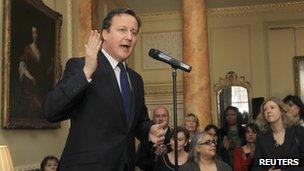Stalking to be made specific criminal offence - Cameron
- Published

David Cameron met stalking victims and other women's campaigners at Downing Street
Stalking is to be made a specific criminal offence in England and Wales, Prime Minister David Cameron has said.
Mr Cameron met stalking victims later at Number 10 in a reception to mark International Women's Day.
The prime minister described stalking as "an abhorrent crime" which "makes life a living hell for the victims".
Campaigners have long claimed dealing with stalking under existing harassment laws is inadequate. In Scotland stalking was made an offence in 2010.
The government has pledged to introduce two new offences in England and Wales - stalking, and stalking where there is a fear of violence.
Home Secretary Theresa May said police would also be given new powers of entry to investigate stalking offences.
Currently police cannot enter a property while investigating a complaint of harassment.
A parliamentary inquiry has called for a new offence to be introduced at once, saying harassment and intimidation can often turn into murder.
Speaking after a meeting with stalking victims in Downing Street, Mr Cameron said: "The existing law isn't good enough or strong enough.
"There are too many women who've been suffering from this and I want to make sure we not only have a separate law criminalising stalking but we have better training in the police, in the probation service, in our courts so we really get to grips with what is a dreadful crime.
"Sometimes it can end in violence or even murder but in all cases it's completely unacceptable that someone is stalked and pestered when they've said 'No'."
Shadow home secretary Yvette Cooper is calling for the government to support a Labour amendment to the Protection of Freedoms Bill, which would create a new offence, in the House of Lords on Monday.
"We need rapid progress and we need a new law which is strong enough; half-hearted measures won't be enough," she said.
"Victims have already waited too long, and the prime minister should support our tough and clear new offence."
The calls for reform come after a series of cases involving stalkers who went on to kill, the latest being Clifford Mills, 49, who stalked his ex-girlfriend Lorna Smith on Facebook before stabbing her to death at his flat in Brixton, south London, in February last year.
He was jailed last month for life, with a minimum term of 21 years, after being found guilty of murder.

Lorna Smith was killed in February last year after being stalked
The parliamentary inquiry heard that some 120,000 victims, mostly women, are stalked each year but only 53,000 incidents are recorded as crimes by police and only one in 50 of these reports leads to an offender being jailed.
Assistant Chief Constable Garry Shewan, the lead on stalking for the Association of Chief Police Officers, said the legislation was a "positive step".
"The key to protecting victims and alleviating the fear and harm is through everyone taking the issue seriously, through extensive awareness-raising and through improved and effective response to stalking by police officers, the Crown Prosecution Service, the courts and the health service," he added.
Meanwhile, the government also announced that men in Britain accused of raping or assaulting women abroad could be put on trial in the UK courts.
Mr Cameron and Deputy Prime Minister Nick Clegg stated their intention to sign up to the Council of Europe's Convention on Violence Against Women and Domestic Violence.
Once this treaty is ratified into UK law, offenders who cannot be taken to trial in the country where the alleged crime was committed will face prosecution in the UK.
In a joint statement Mr Cameron and Mr Clegg said: "This agreement is not just a piece of paper. It's going to lift the standards of protection for women across Europe, give greater support for victims and, crucially, bring many more perpetrators to justice."
Mr Cameron's official spokesman dismissed reports the convention would mean a ban on wolf-whistling.
He told a media briefing in Westminster: "We have harassment laws in this country. We are not proposing to criminalise wolf-whistling.
"We are talking about a serious issue of harassment and stalking and domestic violence and abuse."
- Published7 February 2012
- Published7 February 2012